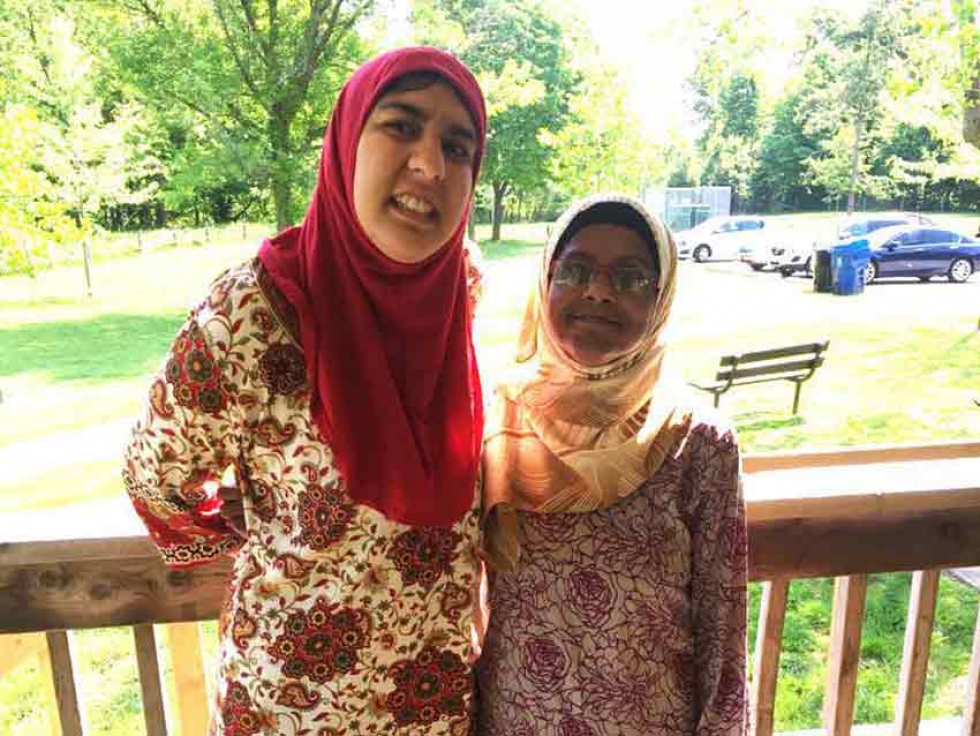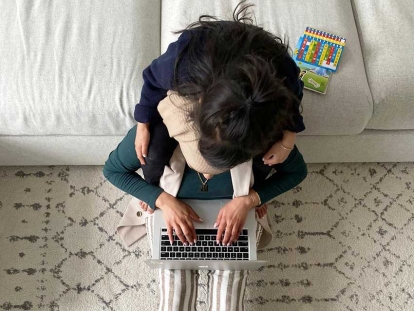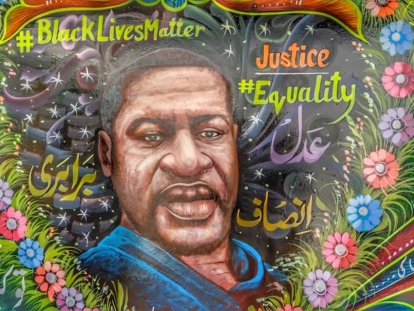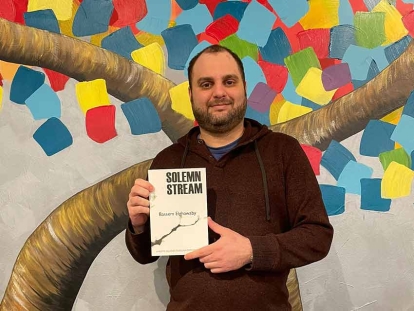 Suraiya (left) on an outing with Shameena. Prior to the COVID-19 crisis, Shameena spent time with Suraiya during the week, taking her for walks, Friday prayers, and other recreational activities in the community.
Ruksana Hemani
Suraiya (left) on an outing with Shameena. Prior to the COVID-19 crisis, Shameena spent time with Suraiya during the week, taking her for walks, Friday prayers, and other recreational activities in the community.
Ruksana Hemani
May
Pushed Further to the Margins: How Physical Distancing Impacts Families Living with Disabilities
Written by Zehra KamaniThe COVID-19 crisis hovers over the globe today like a haze of smog, and with it, whatever concepts of “normalcy” we once held have now been completely distorted. The foreseeable future of school, playdates, and extracurricular activities are confined to the household. With schools closed and non-essential activities at a halt, parents have been scrambling to hone their skills in becoming teachers and “techies”, cleaners and cooks, at the beck and call of their families around the clock.
Conversations surrounding vulnerable population, those who are statistically more prone to getting infected by the virus and suffer more serious consequences, point to the elderly population and those with pre-existing medical conditions. But one population that suffers a big hit, a group that was often neglected in our pre-COVID existence, is families living with disabilities.
As the coronavirus has moved all educational and social activities to the digital world, platforms like Zoom and Houseparty are becoming increasingly popular in households today, allowing conversations, celebrations, and lessons to be conveyed online. However, with the virus showing minimal signs of relenting soon, and as communities across the province count the days and weeks we continue to #stayhome, there is a growing appreciation that technology, as indebted and dependent as we are to it, are not substitutes for in-person interactions. This holds especially true for individuals and families with disabilities, who rely heavily on interacting with others, whether it is to receive formal therapy, day-to-day care, respite services, or simply the opportunity to integrate with others in regular day-to-day activities and build upon their social and communication skills.
Amongst the primary concerns for families with disabilities, receiving the therapy that helps their family member with a disability learn essential skills is a big one.
“[Parents] are worried about their kids,” says Fatema Dada, board member of SMILE Canada. “Kids’ therapy has stopped. If you have a young child, that means your child is going to start to regress, so you’re worrying about the progress you’ve made. Online therapy is not the same as in person.”
SMILE Canada is an organization that advocates for and provides support and services to families of children and youth with physical and developmental disabilities. They currently serve about 200 families with disabilities in their network from across the Greater Toronto Area. Their services include buddy programs, recreational events for kids and youth, and support groups for parents. They also work with community and religious leaders such as youth and support groups in mosques to raise disability awareness and promote inclusion.
One important aspect of their services includes providing financial assistance for families to use for things like respite services, therapy and equipment.
Today, technology has become an essential piece of equipment for children to access therapy. However, the success of online therapy highly depends on their ability to use technology successfully.
Mahdi Datoo, a nine year old boy with autism, uses an iPad for online acquired behaviour analysis (ABA) therapy everyday from Monday to Friday for 2 hours each day. Prior to the closure of all schools and programs, his therapy took place in person on Tuesdays and Thursdays from 9 am to 4 pm.
“Mahdi is doing well with online therapy so far,” comments Fatimah Datoo, Mahdi’s mother. “Part of the reason is because he is better able to sit in front of the computer for a period of time… Had Mahdi been younger, I don’t think he would have been able to sit through the sessions and participate as well as he is now.”
Datoo notes that in-person therapy is definitely more beneficial as it allows children to have social interaction with peers through games, role play, and free time, which is one of the goals she and her husband have set for Mahdi. Social interaction is a big domain that individuals with autism struggle with.
While online group sessions are possible through platforms like Zoom to facilitate social interactions between individuals, not all students with disabilities are able to participate well this way, depending on their specific needs. Many kids with disabilities are simply not able to attend to a screen for extended periods of time. Others who already have difficulties with communication and social skills may not benefit from interacting virtually.
But in addition to that, many families also do not own or are just not able to afford appropriate technology.
This is why SMILE began their Laptop Drive initiative. Their goal is to collect laptops and tablets (or donations to purchase new ones) to provide them to kids with disabilities who can use them for online schooling and to access therapy.
SMILE has also mobilized to conduct “wellness check-ins”. They make weekly telephone calls to families, which are conducted in five different languages including English, Arabic, Somali, Bengali, and Urdu, based on the family’s preference and comfort, to see how they are doing and what they may need so that they can further support them. Sometimes SMILE volunteers are able to assist in picking up essential items like groceries or hygiene products for them, such as for one single mother of a child with a disability who simply cannot leave her house.
“A lot of families have kids that are immune compromised, so they have to do strict isolation measures,” Dada explains. “Single moms can’t go anywhere with their kids.”
SMILE has also assisted in providing clothing to a family of a young boy with autism that lives in a shelter. Many of the families in their network live below the poverty line.
And from the wellness check-in calls, Dada notes that one big takeaway is that for many families, all they really want is somebody to talk to. With kids now at home and unable to utilize the resources and programs they were previously accustomed to, family dynamics have changed and parents are facing increased burden and burnout.
“Routine has totally gone out the window,” Dada explains. “For some kids, routine is a huge thing… If routine is gone off the rails, it’s a problem for the child to deal with.”
Establishing routine is a hallmark for individuals with autism. Being able to have consistency and predictability in the day ensures that they feel less anxious, better cope with challenges, and have greater success in completing their tasks.
This is something that Ruksana Hemani is all too familiar with. Her daughter, Suraiya, a young adult living with autism spectrum disorder, thrives under routine, and can become very anxious with changes to her routine. Suraiya is also nonverbal, which makes things more challenging for Hemani.
“[She] is extremely frustrated because she cannot communicate and she does self-harm when she gets anxious… so it can get difficult at times,” Hemani says.
Suraiya receives funding from the Ontario Disability Support Program (ODSP) as well as Passport funding, which is allocated to adults with developmental disabilities to allow them to become more involved in their community and encourage them to live independently. But even with government assistance, Hemani is not able to afford the added expenses of hiring a therapist who can assist Suraiya with communication, self-help and life skills.
Instead, Hemani has hired a respite worker, Shameena, who spends time with Suraiya during the week, doing activities with her like word searches and math work, taking her for Friday prayers, outdoor walks, and Parks and Recreation programs such as grocery shopping and cooking. While Shameena does not have professional credentials, Suraiya enjoys spending time with her as they explore various social settings.
However, with social/physical distancing being practiced across the province, outings with Shameena have come to a halt. “Suraiya is not doing anything at home,” Hemani says. “She likes going to Shameena’s.”
Charities like SMILE have also taken a hit financially. Upcoming events like fundraisers at various mosques across the Greater Toronto Area (GTA) during the upcoming holy month of Ramadhan, and SMILE’s annual RECFest, an inclusive sporting event that draws large crowds and donations, are no longer happening. This means that opportunities and programs for individuals with disabilities, which have already dwindled, are becoming fewer and farther between. That also means families who already have added expenses going towards services to help their loved one with a disability take a double hit.
“Once COVID ends, I think we will see a real spike in [the need for] assistance, because of what’s happening to the economy, people’s jobs,” Dada explains. “When you have a child with a disability, your expenses are so much more -- extra services, extra therapy, extra equipment -- it’s all extra, extra, extra.”
While the pandemic has moved us towards practicing extra hygiene and extra caution in public, perhaps it is time to reach out to families living with a disability, as well as the charities that assist them, who may need the extra compassion and support.
SMILE has created a Tip Sheets of activities for caregivers to keep children engaged and busy during the COVID shutdown.
To learn more about SMILE Canada's activities and to donate to support their work, click here
This article was produced exclusively for Muslim Link and should not be copied without prior permission from the site. For permission, please write to info@muslimlink.ca.





